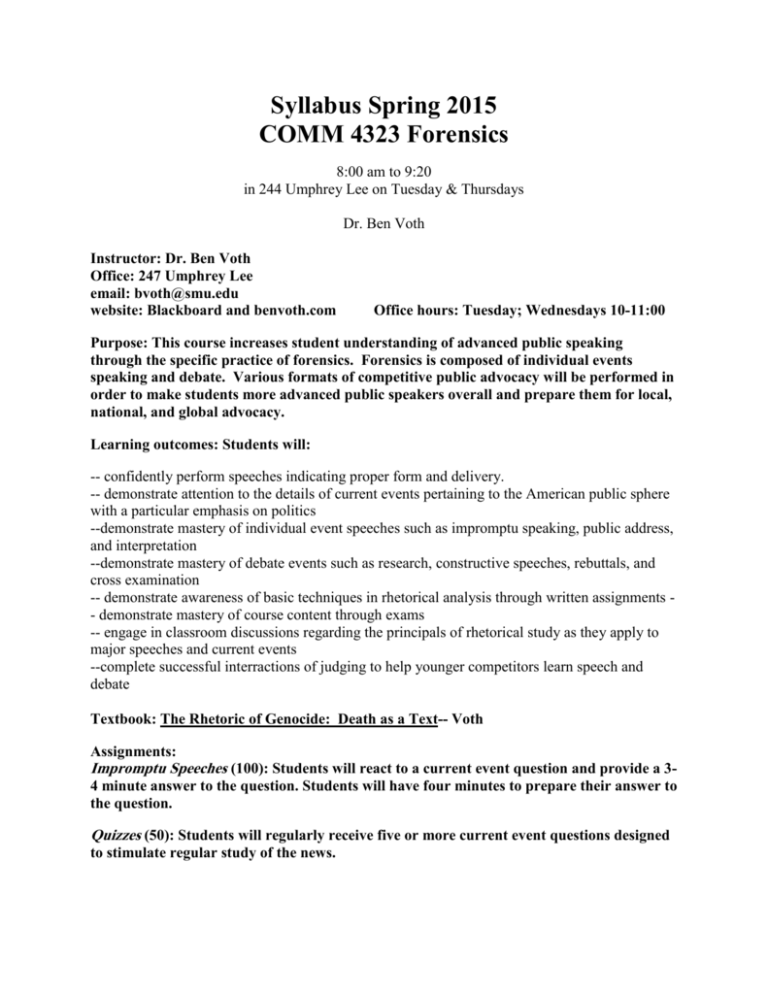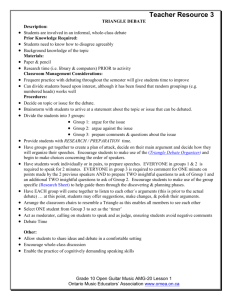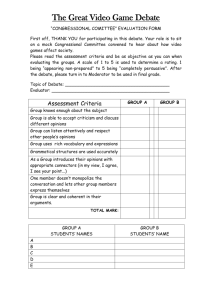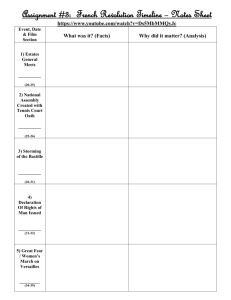Forensics syllabus s2015word
advertisement

Syllabus Spring 2015 COMM 4323 Forensics 8:00 am to 9:20 in 244 Umphrey Lee on Tuesday & Thursdays Dr. Ben Voth Instructor: Dr. Ben Voth Office: 247 Umphrey Lee email: bvoth@smu.edu website: Blackboard and benvoth.com Office hours: Tuesday; Wednesdays 10-11:00 Purpose: This course increases student understanding of advanced public speaking through the specific practice of forensics. Forensics is composed of individual events speaking and debate. Various formats of competitive public advocacy will be performed in order to make students more advanced public speakers overall and prepare them for local, national, and global advocacy. Learning outcomes: Students will: -- confidently perform speeches indicating proper form and delivery. -- demonstrate attention to the details of current events pertaining to the American public sphere with a particular emphasis on politics --demonstrate mastery of individual event speeches such as impromptu speaking, public address, and interpretation --demonstrate mastery of debate events such as research, constructive speeches, rebuttals, and cross examination -- demonstrate awareness of basic techniques in rhetorical analysis through written assignments - demonstrate mastery of course content through exams -- engage in classroom discussions regarding the principals of rhetorical study as they apply to major speeches and current events --complete successful interractions of judging to help younger competitors learn speech and debate Textbook: The Rhetoric of Genocide: Death as a Text-- Voth Assignments: Impromptu Speeches (100): Students will react to a current event question and provide a 34 minute answer to the question. Students will have four minutes to prepare their answer to the question. Quizzes (50): Students will regularly receive five or more current event questions designed to stimulate regular study of the news. Community forensics volunteering (100): Students will attend two outside class events supporting speech and debate activities in a community such as the Dallas Urban Debate Alliance. Students will judge at least two rounds of activity per event (This means four ballots in total). Students must produce proof of their attendance at the event. Joseph Reyes is a contact person for DUDA events which are easy to access and help with (joseph@dallasurbandebate.org). Speech Event (100): Students will perform a memorized speech conforming to genres described in the course. Judging (50): Students will complete ballots for all in class competition events. Public debates (50): Students must attend and participate in two public debate events. These events are typically at 7-8 pm in the evening. Class debate (200): Students will create evidence and debate in class with a partner. topics will be created for the debates. Alumni contacts (100): Students will find students who competed in speech and debate at SMU from that past century. Students should do historical research to find out pictures and at least five names of people who did this at SMU in the past. Grading Scale: Impromptu speeches Alumni listings IE speech Debate research Quizzes Judging in Class Foren volunteer Public debates Debate TOT AL A = 940 and above A- = 939 to 896 B+ = 895 to 850 B = 849 to 820 B - = 819 to 796 C+ = 795 to 750 C = 749 to 720 C- = 719 to 696 Below is D or F Syllabus TR Spring 2015 100 100 100 100 200 100 50 50 200 1000 January 20 What is Rhetoric? Why we study communication & argumentation? 22 Speeches of introduction/ Extemporaneous speaking 27 Extemporaneous speaking/ Judging 29 Argumentative speaking February 3 Extemp speeches 1 5 Extemp speeches 2 10 Farmer vs. Alinsky 12 Basics of debate/ Judging Debates 17 Resolution/ Research 19 Problems in Reasoning/ Fallacies 24 Evaluating Evidence 25 Is Reality secular? lecture: Mary Poplin 26 Judging and the ballot Feb 28 weekend UTD Dallas Debate tournament March 3 Review 4 Voth sermon on Christianity & Intellectual life @ Underground 5 Midterm Exam 10 Spring Break 12 Spring Break JCCC Debate nationals in Kansas City 17 Extemp round 2 on Debate resolution 19 Extemp round 2 on Debate resolution 24 Bush Presidential Conference-Hofstra/ Research 26 Bush Presidential Conference-Hofstra/ Research 31 James Farmer Jr. & the Great Debaters April 2 Flowing and debate organization 7 Constructive speeches in a debate 9 Rebuttal speeches 14 Cross examination 16 Review 21 TBA 23 TBA 28 Debate 1 30 Debate 2 May Final Exam MAY 7 Thursday 3pm to 6pm 3 pm Debate 3 4 pm Debate 4 5 pm Debate 5 Debate topic 2014- 2015 Resolved: The United States should legalize all or nearly all of one or more of the following in the United States: marihuana, online gambling, physician-assisted suicide, prostitution, the sale of human organs. Ukraine Presidential power global agression disadvantage A. Link-- Reducing Presidential Military incites global aggression and war Cliff May 2014 http://townhall.com/columnists/cliffmay/2014/03/13/punish-putinn1808039?utm_source=thdaily&utm_medium=email&utm_campaign=nl President of the Foundation for the Defense of Democracies. Si vis pacem, para bellum: That’s Latin for "If you want peace, prepare for war,” a doctrine dating back to Plato. President Obama does not subscribe to it. Instead, he assures us that the “tide of war is receding.” But Iran, the world’s leading sponsor of terrorism, continues to spin centrifuges. Al Qaeda forces are fighting in Syria, Iraq, Yemen and North Africa. China is throwing around its growing military weight – including a 12% increase in military spending for 2014. And, again, Putin’s troops have seized Crimea, six years after having taken two big bites out of Georgia. You don’t have to be Clausewitz to see that this is the wrong moment for the United States to take another “peace dividend,” to shrink the military, reduce capabilities and readiness. The list above is by no means exhaustive. The point is to adopt policies that will make the United States stronger -- economically, militarily and by extension diplomatically. Nothing is more likely to cause Putin to regret his actions and think hard before repeating them elsewhere. Nothing would send a clearer message to Iran, China and other aspiring empire-builders. “You don’t just in the 21st century behave in 19th century fashion,” Secretary of State John Kerry said the other day. That’s true in the sense that top hats and petticoats are no longer stylish. Despotism, however, seems to be making a comeback. In consequence, the United States has 21st century responsibilities. If we’re unwilling or unable to shoulder them, no one else will. Uniqueness: Now is the key time to maintain presidential power to prevent global aggression Cliff May 2014 http://townhall.com/columnists/cliffmay/2014/03/13/punish-putinn1808039?utm_source=thdaily&utm_medium=email&utm_campaign=nl President of the Foundation for the Defense of Democracies. But what can an American president do? No one expects Barack Obama to put “boots on the ground.” Serious economic warfare – using “banks instead of tanks” as Russian dissident Garry Kasparov has proposed – may be impossible because Europeans have grown dependent on Russia for natural gas. The answer is not to posture. Nor, I think, is it to punish Russia directly. Instead, recognize that Putin, along with Iran’s Supreme Leader, China’s rulers and other dubious international actors, regard the diminution of American power as their strategic goal, a necessary precondition for the achievement of their regional and global ambitions. So make it clear that the weakening of America stops right here and right now. Do that by implementing policies to strengthen America. That will frustrate our adversaries and enemies, and bolster our allies. Teaching philosophy of Ben Voth November 30, 2013 My teaching purpose is to equip individuals to have their voice. Philosophically, I approach this from a rhetorical tradition of study. Rooted as far back as Aristotle’s definition of rhetoric-- the faculty of observing in any given situation, all available means of persuasion-- rhetorical study seeks to guide students in discovering how to best convince an audience. Methodologically, I teach this perspective in may ways: argumentation, debate, public speaking, rhetorical criticism of speeches, textual analysis, and other forms of communication study. As suggested by my list, my philosophy for equipping individuals to have a voice in society is rooted primarily in my experience and expertise as a debate coach. I believe that the ethical conditions of our human societies depends upon free communication and individuals capable of carrying this out. A principal I articulate in all courses is an ethical condition known as: discursive complexity. Discursive complexity is the capacity of an individual, group, organization, or society to entertain and consider multiple points of view. Without this, our ethical condition is terminal and with it, our opportunities and strength grow. I believe every person should be equipped to speak and communicate in order to best preserve and improve the future. Ideas mean little unless they are communicated. Because there are so many ideas competing in the midst of limited time and resources, quality of communication is vital to this ethical process. At a deep philosophical and even theological level, I seek to improve the human ability to “love one another.” Though often romanticized, love is simply meeting the needs of another person. Human beings have a need to communicate. In communicating, we meet our needs and the needs of our fellow human beings. Martin Luther King, a great American rhetor, explained the communication principal bearing on this philosophical point: “Men often hate each other because they fear each other; they fear each other because they don't know each other; they don't know each other because they cannot communicate.” I teach individuals to have a voice, so that their lives can be better and therefore all of society can be better. Whether I was teaching Holocaust survivors, city employees, college freshman, accomplished seniors, fellow faculty, high school students or any member of the community; I taught them to speak so the world could be better and more easily be changed from the world that is to the world that should be. Communication makes that possible. When I look for outcomes in my teaching, I look for evidence of this better world. I think when you examine my academic record-- my students and my writing-- this is what you will find: a world of people better able to have their voice and make the better world with that voice. Syllabus alternatives: Students have the option of doing more advanced work in exchange for higher point values. These higher point values will allow students to forego other parts of the curriculum. Optional values: 250 points Performing a public debate 500 points Completing a full speech or debate tournament [see calendar of tournaments in syllabus] These options are limited by the resources and time of the overall forensics program. Time Limits are 6-2-4 with 5 minutes prep !-- Spring 2015 2015 Southern Methodist University Debate Ballot Division__________ Round_______ Room: UL ______ Judge ___________________ Affirmative______________________________ Negative ____________________________ 1st Affirmative 2nd Affirmative 1st Negative 2nd Negative _________ __________ _______________ ____________ ________________ Total_____Rank_____ Total_____ Rank____ Total_____ Rank____ Total_______ Rank______ In my opinion, this debate was won by _________________ representing the_______________. Judge’s Name___________________________ School affiliation: _______________________ Comments and RFD Speaking quality [100pts] Research Materials [100 pts] 1st Affirmative constructive rebuttal speech 1st Negative: 2nd Affirmative: 2nd Negative: RFD: [Reason for Decision]








